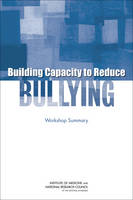


|
|
|
books
| book details |
Building Capacity to Reduce Bullying: Workshop Summary
General rapporteur Patti Simon, General rapporteur Steve Olson, Edited by Board on Children, Youth, and Families, By (author) Committee on Law and Justice, By (author) Institute of Medicine, By (author) National Research Council

|
| on special |
normal price: R 1 663.95
Price: R 1 580.95
|
| book description |
Bullying - long tolerated as just a part of growing up - finally has been recognized as a substantial and preventable health problem. Bullying is associated with anxiety, depression, poor school performance, and future delinquent behavior among its targets, and reports regularly surface of youth who have committed suicide at least in part because of intolerable bullying. Bullying also can have harmful effects on children who bully, on bystanders, on school climates, and on society at large. Bullying can occur at all ages, from before elementary school to after high school. It can take the form of physical violence, verbal attacks, social isolation, spreading rumors, or cyberbullying. Increased concern about bullying has led 49 states and the District of Columbia to enact anti-bullying legislation since 1999. In addition, research on the causes, consequences, and prevention of bullying has expanded greatly in recent decades. However, major gaps still exist in the understanding of bullying and of interventions that can prevent or mitigate the effects of bullying. Building Capacity to Reduce Bullying is the summary of a workshop convened by the Board on Children, Youth, and Families of the Institute of Medicine and National Research Council in April 2014 to identify the conceptual models and interventions that have proven effective in decreasing bullying, examine models that could increase protective factors and mitigate the negative effects of bullying, and explore the appropriate roles of different groups in preventing bullying. This report reviews research on bullying prevention and intervention efforts as well as efforts in related areas of research and practice, implemented in a range of contexts and settings, including schools, peers, families, communities, laws and public policies, and technology. Building Capacity to Reduce Bullying considers how involvement or lack of involvement by these sectors influences opportunities for bullying, and appropriate roles for these sectors in preventing bullying. This report highlights current research on bullying prevention, considers what works and what does not work, and derives lessons learned.
| product details |

Normally shipped |
Publisher | National Academies Press
Published date | 26 Sep 2014
Language |
Format | Paperback / softback
Pages | 150
Dimensions | 229 x 152 x 0mm (L x W x H)
Weight | 0g
ISBN | 978-0-3093-0398-9
Readership Age |
BISAC | education / educational policy & reform / general
| other options |

Normally shipped |
Readership Age |
Normal Price | R 2 020.95
Price | R 1 919.95
| on special |
|
|
|
To view the items in your trolley please sign in.
| sign in |
|
|
|
| specials |
|
|

|
Carlo Rovelli
Paperback / softback
224 pages
was: R 295.95
now: R 265.95
|
Originally published in Italian: L'ordine del tempo (Milan: Adelphi Edizioni, 2017).
|

|
Carlo Rovelli
Paperback / softback
208 pages
was: R 295.95
now: R 265.95
|
|
|
|
|